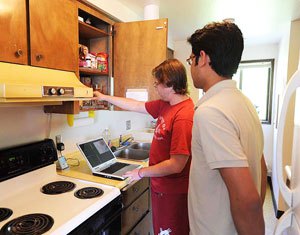 The CASAS Smart Home project is a multi-disciplinary research project at Washington State University (Pullman, WA) focused on the creation of an intelligent home environment.
The CASAS Smart Home project is a multi-disciplinary research project at Washington State University (Pullman, WA) focused on the creation of an intelligent home environment.
The Center for Advanced Studies in Adaptive Systems (CASAS) views the smart home as an intelligent agent that perceives its environment through the use of sensors, and can act upon the environment through the use of actuators. The home has certain overall goals, such as minimizing the cost of maintaining the home and maximizing the comfort of its inhabitants. In order to meet these goals, the house must be able to reason about and adapt to provided information.
Dr. Diane Cook has been testing the technology in sheltered accommodation for the elderly to help them get up, prepare food, make hands-free phone calls and remember to take their medication. As well as making life easier for everyone, she believes it could revolutionize care for the elderly by allowing people with physical and mental disabilities to look after themselves at home for longer.
The ability to assess information and act by automating the control of devices and appliances goes well beyond what houses are capable of today. But Cook’s team has created “fairly robust models” for such a house, and she can envision a day when homeowners go to their local home improvement store to purchase sensor kits they install themselves. (A 2,000-square-foot apartment at the retirement home costs about $2,000 to rig with wireless sensors and software). Cook’s ultimate vision for is to detect changes in occupant behavior that indicate cognitive or physical deterioration. If the house could adjust to such impairments and provide warnings to family members, elderly with physical and mental disabilities can look after themselves at home for longer.
Cook’s work is funded by the National Institutes of Health, the National Science Foundation and Washington State’s Life Sciences Discovery Fund.
